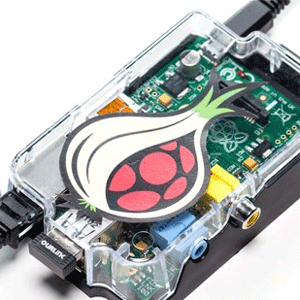 NEWS
NEWS
 NEWS
NEWS
 NEWS
NEWS
![]() The amazing Adafruit Industries has come up with a combination of the Raspberry Pi–a small, micro form factor general purpose computer–with a wireless card and Tor–a powerful Internet anonymizing network and service–in one device: the Onion Pi. For just $90, you can get a kit to construct this little hardware-based peace-of-mind-and-privacy device.
The amazing Adafruit Industries has come up with a combination of the Raspberry Pi–a small, micro form factor general purpose computer–with a wireless card and Tor–a powerful Internet anonymizing network and service–in one device: the Onion Pi. For just $90, you can get a kit to construct this little hardware-based peace-of-mind-and-privacy device.
The idea is simple: the Rasberry Pi loads up a Tor proxy that you can access via ad hoc wireless–it takes some setup, as with all kits and maker projects, but it could be exactly what people looking to increase their privacy in the wake of PRISM and other spying fiascoes might desire.
Using this pack of parts and a free weekend you can build a project that uses a Raspberry Pi, a USB WiFi adapter and Ethernet cable to create a small, low-power and portable privacy Pi.
After it’s built, using it is easy-as-pie. First, plug the Ethernet cable into any Internet provider in your home, work, hotel or conference/event. Next, power up the Pi with the micro USB cable to your laptop or to the wall adapter. The Pi will boot up and create a new secure wireless access point called Onion Pi. Connecting to that access point will automatically route any web browsing from your computer through the anonymizing Tor network.
According to the sales pitch, there is a little bit of set up–but fortunately Adafruit is a space that cheerfully instructs people in how to do things for themselves and there’s an exhaustive tutorial on how to build the kit and set up the Linux OS, and Tor on the device.
For just $90 this device could be a perfect way for the privacy conscious to come to understand not just how to use something like the Raspberry Pi and interact with Linux-based systems. It could even open up new opportunities for people to see what they can do with things like the Raspberry Pi.
In fact, there’s a lot of different ways people have been using the Pi already.
Privacy in the PRISM era
It’s been long understood by those who grew up with the Internet that very little that we do online is actually private. In fact, the social media generation tends to overuse privacy-breaking very-public dialogue; but they use it at the pace that they expect their privacy to be revealed. What most people don’t sign onto the Internet for is the expectation that their ISP or even some random government agency might be looking at what mimics otherwise private correspondence via e-mail.
As a result, we have an era we’re moving into where things we expect to be private–Facebook private messages, e-mail messages, etc.–is becoming obvious that that privacy isn’t always respected. Spying by ISPs and throttling of peer-to-peer networking has pushed younger generations closer to using Virtual Private Networks (VPNs) and thinking about the best practices to keep personal data and correspondence private.
If you have never encountered Tor before, the Onion Pi is also an excellent way to experience how this onion-routing anonymizing network works. The Tor Project uses networking protocol and multiple proxy nodes (run by other Tor users) to help avoid particular forms of surveillance via a concept known as “onion routing,” which basically shuffles packets through a vast network from point-to-point where no individual point along the route knows exactly the beginning or the ending. This makes it much more difficult for people to trace your connection.
However, it’s not a perfect system to protect privacy since it’s only one layer of a well-rounded privacy defence (which is why it shows up on best-practices) and it’s not always the best tool. Combined with VPN, message encryption, and thoughtful personal data protection it can greatly increase privacy; but with anything, even Onion Pi, the question of privacy is about a holistic approach of best practices than it’s any one product.
Privacy is an ongoing process, a practice that involves a sort of cyber-hygiene that if more people spent more time thinking about their privacy, it could help increase overall privacy for everyone.
If you’re curious, look into the Onion Pi today.
Support our mission to keep content open and free by engaging with theCUBE community. Join theCUBE’s Alumni Trust Network, where technology leaders connect, share intelligence and create opportunities.
Founded by tech visionaries John Furrier and Dave Vellante, SiliconANGLE Media has built a dynamic ecosystem of industry-leading digital media brands that reach 15+ million elite tech professionals. Our new proprietary theCUBE AI Video Cloud is breaking ground in audience interaction, leveraging theCUBEai.com neural network to help technology companies make data-driven decisions and stay at the forefront of industry conversations.